 3 citations,
September 2021 in “Journal of Nepal Medical Association”
3 citations,
September 2021 in “Journal of Nepal Medical Association” A woman with complete hair loss and severe hyperthyroidism was successfully treated with azathioprine and hydroxychloroquine.
 3 citations,
March 2021 in “JAAD case reports”
3 citations,
March 2021 in “JAAD case reports” Switching from adalimumab to ixekizumab improved a patient's psoriasis and reversed hair whitening.
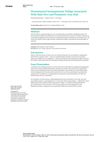 3 citations,
March 2021 in “Cureus”
3 citations,
March 2021 in “Cureus” A rare combination of halo nevi, nonsegmental vitiligo, and early gray hair can occur together.
 3 citations,
February 2021 in “Medical journal, Armed Forces India”
3 citations,
February 2021 in “Medical journal, Armed Forces India” Combination therapy promotes better hair growth and density.
 3 citations,
January 2021 in “Skin appendage disorders”
3 citations,
January 2021 in “Skin appendage disorders” Hair loss can occur about 4 weeks after scalp surgery but usually grows back within 3 months without treatment.
 3 citations,
April 2020 in “British Journal of Dermatology”
3 citations,
April 2020 in “British Journal of Dermatology” PRP treatment helps 70.1% of hair loss patients after two sessions.
 3 citations,
May 2019 in “International journal of research in dermatology”
3 citations,
May 2019 in “International journal of research in dermatology” Platelet rich plasma is an effective treatment for alopecia areata.
 3 citations,
September 2018 in “Dermatologic Surgery”
3 citations,
September 2018 in “Dermatologic Surgery” Platelet-Rich Plasma (PRP) can improve hair loss in cicatricial alopecia cases, but treatment must be ongoing and results vary among patients.
 3 citations,
January 2008 in “Journal of the American Academy of Dermatology”
3 citations,
January 2008 in “Journal of the American Academy of Dermatology” A patient's skin rash did not affect the area where a previous viral rash was healing, suggesting a rare immune response.
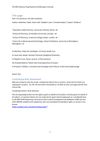 2 citations,
February 2022 in “BMJ”
2 citations,
February 2022 in “BMJ” Emollients can make fabrics more flammable, so take safety precautions.
 2 citations,
January 2022 in “Skin appendage disorders”
2 citations,
January 2022 in “Skin appendage disorders” A combination of methotrexate injections and CO2 laser treatment led to complete hair regrowth in two patients with hard-to-treat alopecia.
 2 citations,
September 2021 in “JAAD case reports”
2 citations,
September 2021 in “JAAD case reports” Dupilumab helped a woman with severe hair loss regrow her hair quickly and maintain it for six months after stopping treatment.
 2 citations,
January 2019 in “Annals of dermatology/Annals of Dermatology”
2 citations,
January 2019 in “Annals of dermatology/Annals of Dermatology” A patient experienced permanent hair loss due to an allergic reaction to a corticosteroid injection.
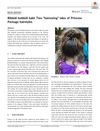 2 citations,
April 2018 in “Pediatric dermatology”
2 citations,
April 2018 in “Pediatric dermatology” Elaborate princess hairstyles at a theme park caused hair loss and scalp damage in young girls.
 2 citations,
January 2015 in “Journal of cosmetology & trichology”
2 citations,
January 2015 in “Journal of cosmetology & trichology” Need better hair loss treatments beyond minoxidil, finasteride, and transplants.
 2 citations,
February 2014 in “Journal of Crohn's and colitis”
2 citations,
February 2014 in “Journal of Crohn's and colitis” Some IBD patients on anti-TNFs developed severe skin issues, but ustekinumab helped.
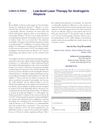 2 citations,
January 2014 in “International Journal of Trichology”
2 citations,
January 2014 in “International Journal of Trichology” Low-level laser therapy may increase hair density in pattern hair loss.
 2 citations,
July 2010 in “Clinical and Experimental Dermatology”
2 citations,
July 2010 in “Clinical and Experimental Dermatology” Delaying hair loss treatment reduces its effectiveness.
 2 citations,
May 2001 in “Current problems in dermatology”
2 citations,
May 2001 in “Current problems in dermatology” The conclusion is that effectively treating hair disorders is difficult due to the complex factors affecting hair growth and more research is needed to improve treatments.
 1 citations,
September 2023 in “JCEM case reports”
1 citations,
September 2023 in “JCEM case reports” GnRH analogues are effective for diagnosing and treating female androgen excess, offering a non-surgical option.
 1 citations,
May 2021 in “Journal of Cosmetic Dermatology”
1 citations,
May 2021 in “Journal of Cosmetic Dermatology” Cosmetic foam product reduces hair loss and increases hair density in men.
 1 citations,
March 2021 in “Current Dermatology Reports”
1 citations,
March 2021 in “Current Dermatology Reports” Various treatments help hair growth, but more research needed for safety and effectiveness.
 1 citations,
February 2021 in “Journal of Dermatological Treatment”
1 citations,
February 2021 in “Journal of Dermatological Treatment” Artificial hair implants can quickly improve looks and life quality, but they have risks like infection and early fiber loss, so more research is needed to confirm their safety and effectiveness.
 1 citations,
January 2021 in “Dermatology online journal”
1 citations,
January 2021 in “Dermatology online journal” A unique case showed a rare combination of two types of lichen planus on the face.
 1 citations,
April 2020 in “Baylor University Medical Center Proceedings”
1 citations,
April 2020 in “Baylor University Medical Center Proceedings” Microneedling with triamcinolone helps hair regrowth in ophiasis alopecia areata.
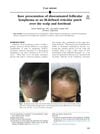 1 citations,
April 2019 in “JAAD case reports”
1 citations,
April 2019 in “JAAD case reports” A woman with lymphoma had a rare skin rash on her scalp and forehead, which was hard to diagnose but responded well to treatment.
 1 citations,
January 2019 in “Acta dermato-venereologica”
1 citations,
January 2019 in “Acta dermato-venereologica” The woman's skin and hair symptoms were confirmed as frontal fibrosing alopecia, and while facial papules are common in such cases, there's no effective local treatment, but systemic treatments can help.
 1 citations,
April 2018 in “The journal of investigative dermatology/Journal of investigative dermatology”
1 citations,
April 2018 in “The journal of investigative dermatology/Journal of investigative dermatology” Oral tofacitinib significantly improves lichen planopilaris symptoms without adverse effects.
 1 citations,
August 2017 in “Asian Journal of Pharmaceutical and Clinical Research”
1 citations,
August 2017 in “Asian Journal of Pharmaceutical and Clinical Research” The 1% ethyl acetate fraction ethosomal gel from Nothopanax scutellarium leaves promotes hair growth but can mildly irritate the skin.
 1 citations,
January 2017 in “Expert opinion on orphan drugs”
1 citations,
January 2017 in “Expert opinion on orphan drugs” Adalimumab is the most effective treatment for severe hidradenitis suppurativa, but more research is needed to improve treatment options.





























